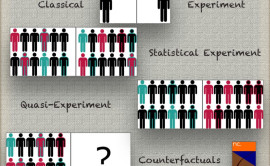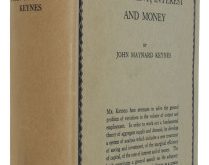La vita davanti a sé .[embedded content]
Read More »Econometrics — science based on whimsical assumptions
Econometrics — science based on whimsical assumptions It is often said that the error term in a regression equation represents the effect of the variables that were omitted from the equation. This is unsatisfactory … There is no easy way out of the difficulty. The conventional interpretation for error terms needs to be reconsidered. At a minimum, something like this would need to be said: The error term represents the combined effect of the omitted...
Read More »Tony Lawson on economics and social ontology
Tony Lawson on economics and social ontology .[embedded content] Modern economics has become increasingly irrelevant to the understanding of the real world. In his seminal book Economics and Reality (1997), Tony Lawson traced this irrelevance to the failure of economists to match their deductive-axiomatic methods with their subject It is — sad to say — as relevant today as it was twenty-five years ago. It is still a fact that within mainstream economics...
Read More »Regeringens sparpolitik bygger på en rad missuppfattningar
När Magdalena Andersson varnar för att Sverige kan hamna i samma läge som de krisande euroländerna visar hon bristande insikt om finanspolitikens grundläggande villkor. Så länge Sverige lånar i sin egen valuta utan fast växelkurs kan Riksbanken avvärja sådana kriser. Det finns ingen osynlig gräns som Sverige plötsligt kan korsa och bli som Grekland bara för att vi ökar vår statsskuld. Skillnaden mellan vår valutaregim och euroländernas är inte kvantitativ utan kvalitativ. Det...
Read More »Pourquoi la dette publique n’est pas un problème
Pourquoi la dette publique n’est pas un problème .[embedded content]
Read More »Why yours truly and other Swedes love paying our taxes
Why yours truly and other Swedes love paying our taxes .[embedded content]
Read More »Who’s afraid of MMT?
Who’s afraid of MMT? As anyone who has ever been responsible for legislative oversight of central bankers knows, they do not like to have their authority challenged. Most of all, they will defend their mystique – that magical aura that hovers over their words, shrouding a slushy mix of banality and baloney in a mist of power and jargon … In our day, the voices of Modern Monetary Theory perturb the sleep not only of present central bankers, but even of...
Read More »Erdogans Abstandsregel …
.[embedded content]
Read More »A tragedy of statistical theory
A tragedy of statistical theory Methodologists (including myself) can at times exhibit poor judgment about which of their new discoveries, distinctions, and methods are of practical importance, and which are charitably described as ‘academic’ … Weighing the costs and benefits of proposed formalizations is crucial for allocating scarce resources for research and teaching, and can depend heavily on the application … Much benefit can accrue from thinking a...
Read More »Är hög statsskuld — verkligen — problemet?
Är hög statsskuld — verkligen — problemet? .[embedded content] När depressionen drabbade 1930-talets industrivärld visade sig den ekonomiska teorin inte vara till någon större hjälp att komma ur situationen. Den engelske nationalekonomen John Maynard Keynes såg behovet av att utveckla en ny teori som på bröt mot den etablerade sanningen. I The General Theory of Employment, Interest and Money (1936) presenterade han sitt alternativ. Vad som behövs nu är...
Read More » Lars P. Syll
Lars P. Syll





